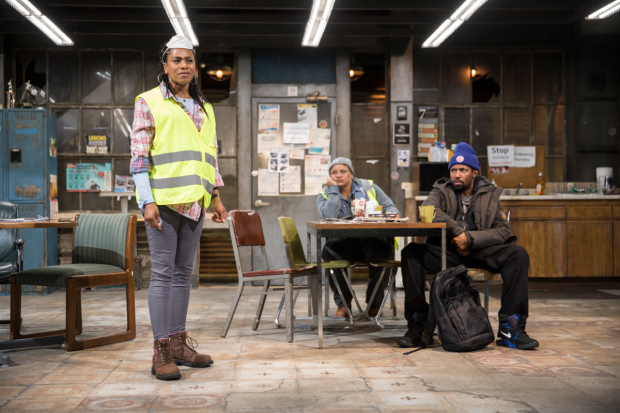Skeleton Crew Draws Attention to the Disenfranchised in America
Dominique Morisseau’s drama runs at the Geffen.

(© Chris Whitaker)
The mockery of the American dream lies at the heart of Skeleton Crew, where trade workers invest their lives in a company that easily turns its back on them. Part of Dominique Morisseau's Detroit Project trilogy, Skeleton Crew reflects a distant past when the economy choked and the government ignored average Americans losing their jobs, their homes, and their futures. The current production at the Geffen, directed by Patricia McGregor, could not be more timely.
At a struggling stamping plant in Detroit during the 2008 auto-industry crisis, three assembly-line workers and their supervisor handle, in diverse ways, rumors of the plant closing. Reggie (D.B. Woodside) must walk the line of management, even though he came up through the ranks of the workers and is tightly bound to his employees. Pregnant Shanita (Kelly McCreary) begs for a future for a baby. Dez (Amari Cheatom) struggles to create his own business away from the plant. The group's mother hen and union rep, Faye (Caroline Stefanie Clay), who has invested 29 years at the factory, feels a responsibility to her colleagues. She also can't deny her loyalty to Reggie, whom she practically raised alongside his mother.
These driven souls are just trying to survive paycheck to paycheck. The cards have been stacked against them. They have no control over the failing economy or how upper management, and their government, are selling them out to generate profits.
The audience quickly sympathizes with these fully formed characters, and Morisseau's dialogue is crisp and authentic. Morisseau trusts the audience's attention and intelligence and chooses not to spell everything out, understanding that the essence is there between the lines. She also makes it clear how much pride the characters have for their jobs and the industry for which they've chosen to work. This makes is all the more heartbreaking that the factory doesn't have the same investment in the workers.
Like the assembly line shown onstage, the cast is a finely tuned organism, with each actor bringing realistic agony to their parts. Woodside demonstrates his character's torn allegiances between supporting his family and protecting his workers, with mannerisms and short-tempered line readings that project someone who has been stuck up all night worrying. McCreary radiates kindness and intelligence as the mother-to-be and represents the hope that the factory desperately needs to survive. Cheatom exudes hardness and the brash behavior one would expect for someone whose options have been limited despite hard work. When Dez hides a gun in his locker, Cheatom makes the choice to have him treat it more like a security blanket than a vehicle for rage and destruction. As the group's lioness, Clay commands the stage even when she's not in the room. Loud, boisterous, and motherly, she gives this rule-breaking veteran dignity.
Director McGregor paints a picture of despair and hope in this factory break room. Rachel Myers's two-story set is topped with a moving assembly line of tire spokes upstairs. Broken windows, flaking paint, and caked mud on the windowpanes illustrates what little care the management places on maintaining a safe and comfortable work environment. Even a worker's union billboard has lost some of the neon letters, suggesting that the workers' established protectors have lost faith. Shepard Fairey's iconic Obama Hope sticker sits on the bulletin board wall, a reminder that fresh days do lie ahead. Pablo Santiago enhances the murky mood with florescent lighting and flashes of machines hitting metal. Sound designer Everett Elton Bradman turns a clicking time clock, a humming fridge, and the clanking of the machines upstairs into a cacophony.
The play takes place in a precarious time in our recent history, where bank deregulation and risky sub-prime loans contributed to a collapsing country. Ten years later, deregulation and sub-prime loans have returned like a sty. Skeleton Crew reminds audiences who loses when politics ignore ramifications.









